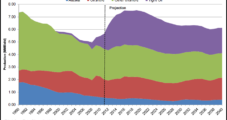Although President Obama and the participants in a town hall meeting at Binghamton University in New York on Friday devoted most of their discourse to education, energy was mentioned once, with the president acknowledging the rise of natural gas but calling for further investment in alternative energy not derived from fossil fuels.
Influence
Articles from Influence
Industry Brief
Pacific Northwest water flows, which can influence summer energy supplies throughout the West, are likely to differ greatly between the northeasterly and southeasterly parts of the four-state and far western Canada region, according to the latest analysis from the Northwest Power and Conservation Council (NPCC). Below-average steam flows can be expected in the Snake River basin and eastern Oregon in the southern part of the Columbia River Basin, but flows are expected to be near or just slightly below normal in the upper Columbia and main Columbia River this spring and summer. “The highest runoff forecast in the basin can be found in the upper Columbia in British Columbia,” NPCC Manager Jim Ruff told the NPCC board. He also concluded that with an only slightly below-normal snowpack as of April 1, it is likely there will be a good summer runoff at near-normal levels in the main Columbia River this spring-summer season. NPCC’s latest analysis follows the Northwest River Forecast Center predicting that river flows for the first seven months this year will be about 89% of normal, and the fact that they are that high is attributable to much higher-than-normal precipitation last fall (see Daily GPI, April 8).
Low-Carbon, Renewables Switch Facing Headwinds
Global efforts for the first time are underway to influence a shift toward low-carbon energy sources and to renewables, but the transition would create new challenges unlike any other in history, according to a report by IHS Inc. and the World Economic Forum (WEF).
Shift to Low-Carbon, Renewable Resources Facing Headwinds
Global efforts for the first time are under way to influence a shift toward low-carbon energy sources and to renewables, but the transition would create new challenges unlike any other in history, according to a report issued Tuesday at IHS CERAWeek 2013 in Houston.

Report: Global Shale Oil Production 14M b/d by 2035
Worldwide production of shale oil has the potential to reach 14 million b/d by 2035, about 12% of the world’s total oil supply, prompting a 25-40% decline in oil prices, according to a report issued Thursday by PwC.
Gas Industry Had Early Access to New York Rules, Says Group
Natural gas industry representatives were granted early access to New York’s preliminary unconventional drilling regulations up to six weeks before the rules were made public, the public health advocate Environmental Working Group (EWG) claimed on Thursday, citing documents obtained under a Freedom of Information (FOI) request.
Two Federal Court Shale Lease Decisions Go Chesapeake’s Way
Two separate decisions in the U.S. District Court for the Northern District of New York came down mostly on the side of shale play giant Chesapeake Energy Corp. in a year-old dispute over the extension of leases from landowners at below-market prices. Landowners in parts of four counties in New York state’s portion of the Marcellus Shale filed lawsuits against the Oklahoma-based shale operator.
NGSA’s Horvath Dismisses Shale’s Black Swans
The future of American’s shale industry is bright and the darkest shadows on the horizon are nothing more than black swans — potential problems that involve high impact risks but a low probability of occurring — according to Natural Gas Supply Association of America (NGSA) CEO R. Skip Horvath.
NOAA: La Nina to Again Influence Winter Weather
For the second year in a row, a La Nina event — cooling of ocean surface temperatures off the western coast of South America — will influence winter weather patterns across the United States, while the less predictable Arctic Oscillation could produce “dramatic” swings in winter temperatures, according to the National Oceanic and Atmospheric Administration (NOAA).
NOAA: La Nina to Again Influence Winter Weather
For the second year in a row, a La Nina event — cooling of ocean surface temperatures off the western coast of South America — will influence winter weather patterns across the United States, while the less predictable Arctic Oscillation could produce “dramatic” swings in winter temperatures, according to the National Oceanic and Atmospheric Administration (NOAA).




